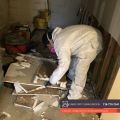Understanding Mold in Commercial Buildings: Types, Causes, and Management
Mold in commercial buildings is not just an aesthetic concern but a potential hazard to health and property. Recognizing the types of mold, understanding the causes of growth, and implementing effective management strategies are crucial for maintaining a safe and healthy environment for employees and visitors alike. Bay Area Mold Pros provides professional mold testing and inspection services specifically tailored to commercial buildings, offering comprehensive solutions to address mold-related issues effectively.
Types of Mold Found in Commercial Buildings
- Aspergillus: Commonly found in indoor environments, Aspergillus can cause respiratory issues and allergic reactions in susceptible individuals. It thrives in damp areas with poor ventilation.
- Penicillium: Often discovered on water-damaged materials like ceiling tiles and drywall, Penicillium can produce strong musty odors and contribute to indoor air quality issues.
- Stachybotrys (Black Mold): Known for its dark green or black appearance, Stachybotrys thrives in areas with prolonged moisture exposure, such as water-damaged drywall or ceiling tiles. It can produce mycotoxins, posing health risks to occupants.
- Cladosporium: Cladosporium is a common outdoor mold that can infiltrate commercial buildings through windows, doors, and HVAC systems. It can cause respiratory symptoms and exacerbate allergies.
Causes and Hidden Sources of Mold Growth in Commercial Buildings
- Water Intrusion: Leaky roofs, plumbing fixtures, and windows can introduce moisture into commercial buildings, providing a conducive environment for mold growth.
- Poor Ventilation: Inadequate ventilation can lead to moisture buildup and high humidity levels, promoting mold growth in areas with limited airflow.
- HVAC Systems: Contaminated HVAC systems can spread mold spores throughout the building, contributing to widespread mold contamination.
- Hidden Areas: Mold can hide behind walls, above ceiling tiles, and under flooring, making it challenging to detect without thorough inspection.
Dangerous Mold Species in Commercial Buildings
- Stachybotrys (Black Mold): Black mold is particularly concerning due to its potential to produce mycotoxins, which can cause severe health issues upon exposure.
- Aspergillus and Penicillium: These molds can produce allergens and toxins, posing health risks to occupants, especially those with respiratory conditions or weakened immune systems.
Managing and Preventing Mold Growth in Commercial Buildings
- Regular Maintenance: Implementing a proactive maintenance plan, including routine inspections and repairs of water leaks, can help prevent mold growth.
- Proper Ventilation: Ensuring adequate ventilation in all areas of the building can help reduce moisture levels and inhibit mold growth.
- Moisture Control: Addressing sources of moisture intrusion promptly and maintaining indoor humidity levels below 60% can help prevent mold growth.
Professional Mold Testing and Inspection Services for Commercial Buildings
Bay Area Mold Pros offers professional mold testing and inspection services tailored to the unique needs of commercial buildings. Their certified experts utilize advanced equipment and methodologies to conduct thorough assessments, identify mold growth, and provide detailed analysis reports.
Schedule Your Inspection Today
To ensure a safe and healthy indoor environment for your employees and visitors, schedule an inspection with Bay Area Mold Pros today by calling (650) 762-6228. With their expertise and professional mold services, you can effectively manage mold issues in your commercial building and mitigate potential health risks. Take proactive steps towards mold prevention and remediation with Bay Area Mold Pros' comprehensive solutions.






